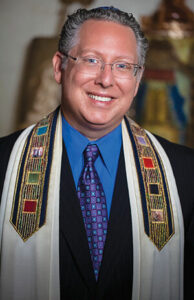
By Rabbi Craig Axler
As we conclude the book of Genesis this Shabbat, the stories we’ve been following since Simchat Torah have been filled with drama, heartbreak and holiness; not to mention sibling rivalry, violence and occasionally reconciliation. Genesis is among the most powerful books because it contains such human and recognizable stories.
As Jacob/Israel faces the end of his life, he needs to give the appropriate messages to his children and grandchildren. Told that his father is ill, Joseph brings his sons Manasseh and Ephraim to be with their grandfather one last time. This encounter sets the pattern for the traditional blessing of sons at the Shabbat and holiday table: “May God make you like Ephraim and Manasseh.” In contrast, we bless daughters: “May God make you like Sarah, Rebecca, Rachel and Leah.” There is an imbalance here, particularly as the parallel rightly seems: “May God make you like Abraham, Isaac and Jacob.” However, Jacob/Israel’s own words set the practice: “And he blessed them on that day, saying: Through you will the people of Israel bless, saying: May God make you like Ephraim and Manasseh.” (Genesis 48:20)
Unpacking this scene helps us understand why this otherwise-obscure reference gets codified. In a repeat of the cycle of preferential treatment being given to younger siblings, Jacob/Israel is presented with his grandsons. Joseph positions them with the elder (Manasseh) in front of Jacob/Israel’s right hand, the hand of higher blessing. Echoing earlier stories, we are told “Israel’s eyes had grown dim through age, and he could no longer see; so [Joseph] brought them near to him and he kissed and hugged them.”(Genesis 48:10) The scene must remind Jacob of his final encounter with Isaac, whose “eyes had dimmed” at the very moment when he stole the birthright. The closeness and physicality of the moment is so evocative, as is what follows. With the eldest at his right hand, Jacob/Israel crosses his hands to switch their placement, giving the firstborn blessing to the younger Ephraim. Even as he is corrected by Joseph, Jacob/Israel persists in giving the preferential blessing to the younger, calling them in the order we still use today.
There are cycles of behavior that repeat in families, and Torah is no different. This preferencing of the younger is the way that Jacob/Israel’s own relationship with Esau ruptured. The story of Abraham’s sons Isaac and Ishmael contains a seemingly uneven blessing, preferring the younger. Seemingly ordained by God, and inevitably leading to hurt and suffering, heartache and estrangement, Jacob/Israel continues this cycle.
But cycles of behavior can similarly be broken. And in this reality is one clue as to why we bless children that they might be like Ephraim and Manasseh. Each will be accounted equally as sons of Jacob/Israel, no longer as grandsons, but rather the father of families that bear their own names. Throughout the wilderness wanderings, the tribes of Ephraim and Manasseh will always be called in this way, will encamp around the Tabernacle with Ephraim taking the place of greater prominence. And yet, nowhere do we see the switch of order generating any kind of a break between these siblings. So strong is their bond and love that it matters not which is called first, nor whose head got the right hand and who got the left. It is as though Ephraim and Manasseh are able to simply be happy for one another in all that they are and all that they have. What a beautiful example of a cycle of dysfunction being broken by the power of love. May this love of one another strengthen the whole household of Israel.
Rabbi Craig Axler is spiritual leader of Temple Isaiah in Fulton.





